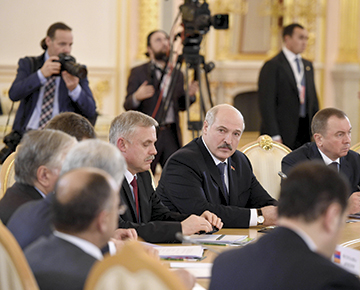
At the CSTO Collective Security Council session, in expanded format
President of Armenia Serzh Sargsyan has told journalists that heads of CSTO member states, who met recently at a session of the CSTO Collective Security Council, are keen to form a coalition against international terrorism, based on the UN Charter and international law.
The threat of international terrorism has recently increased manifold, creating a challenge for the world community in ensuring security of countries and continents.
This vector of interaction has been specified in a statement signed by heads of state, aiming to counteract international terrorism: ‘As a priority, we will work to suppress the activity of the ISIL terrorist group, which has sparked severe bloodshed in many countries and which represents a threat to all humanity.
The heads of state agree that threats towards security in Central Asia are growing, connected with the enhanced activity of ISIL, Taliban, Al-Qaeda and other terrorist organisations within Afghanistan. This is leading to an upsurge of tension on CSTO southern borders, and, accordingly, threatens the organisation’s zone of responsibility.
The presidents believe that further development of collaboration within existing regional structures will facilitate stability across the Eurasian space and globally, as will expansion of interaction between states in the struggle against terrorism: at political level and between special services, profile ministries and departments.
CSTO member states attach great importance to further strengthening comprehensive measures of counteracting the ideology of international terrorism and religious extremism. The heads of state are convinced that the fight against terrorism requires sources of financing to be blocked, as demanded by the profile resolutions of the UN Security Council and FATF international standards.
The statement reads: ‘We confirm the responsibility of all states to make efforts to uncover organisations, individuals and businesses involved in economic ties with ISIL, and other terrorist groups, and to reliably block channels of terrorism financing’.
The heads of CSTO member states have expressed solidarity and support with Russia regarding the incident in which an Su-24 was shot down by the Turkish military. Moreover, the Council has adopted a decision to extend the terms of office of Nikolai Bordyuzha as CSTO General Secretary, until January 1st, 2017.
The Supreme Eurasian Economic Council session showed heads of state in agreement on most issues. The most burning problem tackled by the presidents of Belarus, Russia, Kazakhstan, Kyrgyzstan and Armenia related to trade co-operation with Ukraine.
From January 1st, 2016, Ukraine will join the free trade zone with the EU. Meanwhile, it has entered into a similar agreement with CIS states, leading to unhindered access for European goods to our markets.
Mr. Lukashenko stated, “We are worried that we won’t be able to discuss this topic until January 1st, since little time is left. Those in Europe are already celebrating, and a situation may occur whereby rather than Ukrainian goods flowing into our territory, we may find these replaced by EU goods. These EU goods, having entered Ukraine on zero tariff, will gain access to the CIS free trade zone if we don’t protect ourselves.”
The free trade zone is a unique project of international integration, with customs duties, taxes and payments abolished between signatory states, alongside restrictions on volumes. As a rule, such agreements are signed with several states (rather than with one) and ‘overlapping’ can occur.
Russia has decided to ‘outrun’ the situation. Back on December 16th, Vladimir Putin signed a decree to suspend norms of free trade with Ukraine. Meanwhile, the other five member states in the Eurasian Economic Union are considering follow Russia’s example, changing the external contour of the Union.
The situation remains ambiguous, as Moscow has many times hinted to Kiev that its entry into an EU-Ukraine Association Agreement would bring abolishment of Russia’s free trade regime with Ukraine within the CIS. Our southern neighbour would thus lose its zero customs duty status for goods supplied to Russia. Ukraine has ignored the warning, with President Petro Poroshenko publicly announcing many times that the loss of the Russian market would be compensated for by trade with Europe.
Nevertheless, EAEU member states are yet to fully support Russia’s proposal to shut out Ukraine. Within the next three months, specialists will be monitoring the situation, while elaborating legislation to settle the most sensitive aspects. Information sharing technologies are proving successful for electronic declaration of goods entering the Eurasian Economic Commission, as in use between Belarus and Russia.
A three-month delay may not provide all the answers but we can assume that annulment of the free trade zone agreement with Ukraine won’t lead to tragedy. Trade turnover will fall but primarily at the expense of Ukrainian exports. The current level of customs duties in the EAEU can hardly be referred to as defensive.
Customs duties for partners (such as the EU) stand at 6-7 percent (rather than zero) and Ukrainian goods will be restricted in volume. The likelihood is their price rising by about 10 percent within CIS markets, which will negatively affect their competitiveness. However, some domestic manufacturers will, no doubt, be pleased, having found it difficult previously to compete with Ukrainian goods.
МТ REFERENCE:
The free trade zone is a unique project of international integration, with customs duties, taxes and payments abolished between signatory states, alongside restrictions on volumes. As a rule, such agreements are signed with several states (rather than with one) and ‘overlapping’ can occur.
By Vasily Kharitonov











